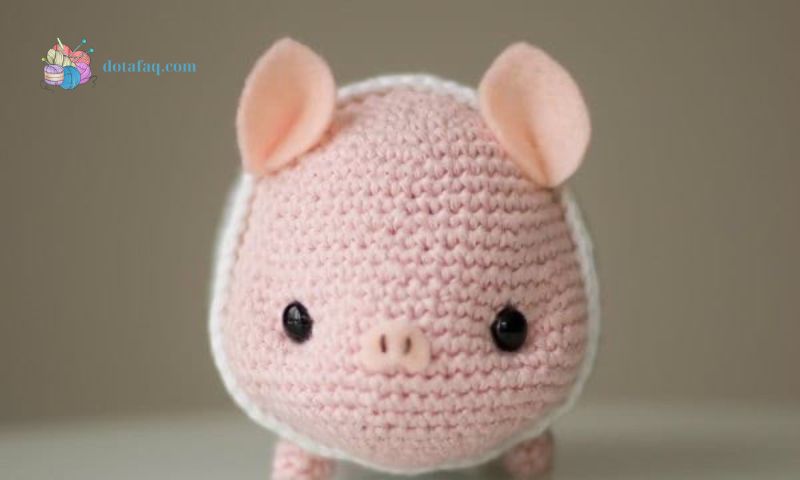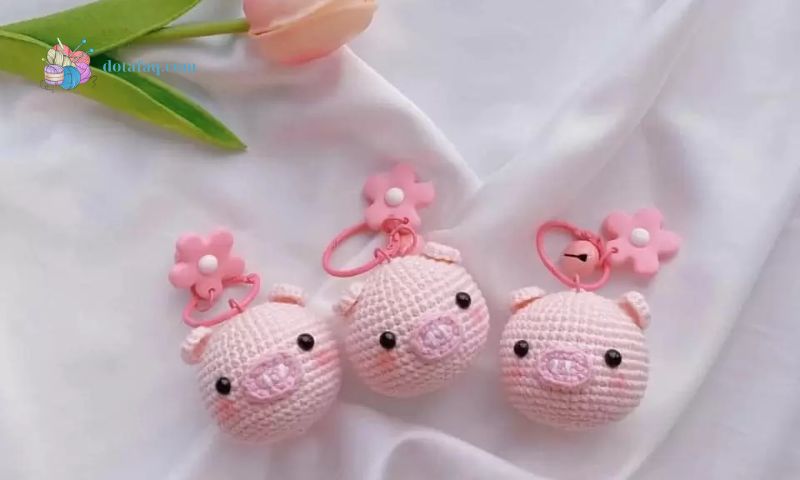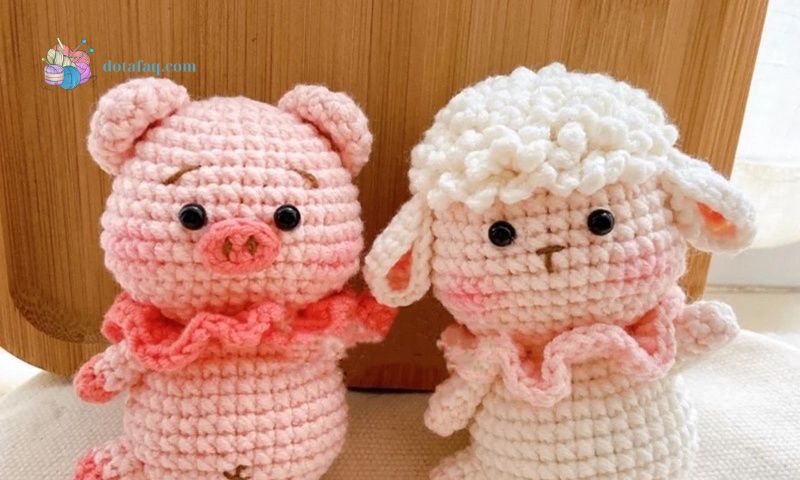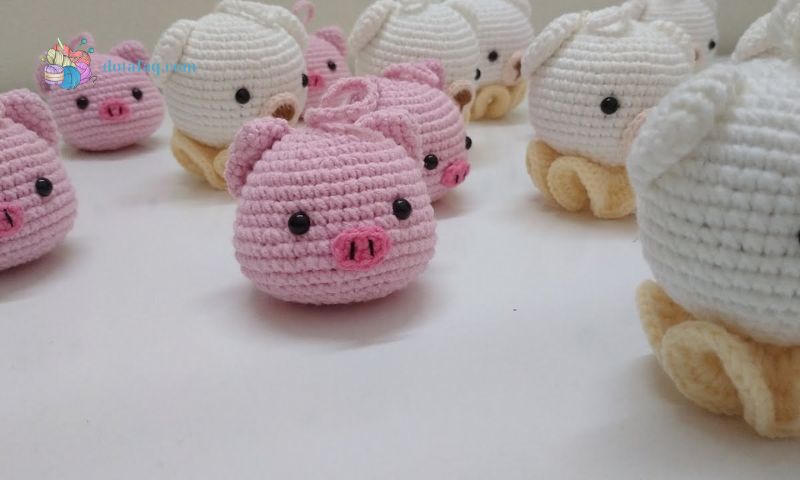Crocheting pig-themed items is a delightful way to showcase your creativity and bring a touch of whimsy to your projects. Pig crochet charts offer a practical approach for crafters to create detailed and charming pig designs with ease. In this comprehensive guide, we will explore the benefits of using pig crochet charts, provide step-by-step instructions for pig crochet projects, and share tips for customizing and perfecting your creations.
Understanding Pig Crochet Charts

A pig crochet chart is a visual guide that represents a crochet pattern specifically designed to create pig-themed projects. Unlike traditional written patterns, crochet charts use symbols and diagrams to indicate the type and placement of stitches. This method is particularly useful for visual learners and those who prefer to see the entire design at a glance.
Benefits of Using Pig Crochet Charts:
- Visual Clarity: Pig crochet charts provide a clear and organized visual representation of the pattern, making it easier to follow complex designs.
- Efficient Learning: For beginners, charts can simplify the crochet process by offering a condensed view of the pattern, reducing the need to decipher lengthy text instructions.
- Pattern Adaptation: By using a pig crochet chart, you can see the overall design, which makes it easier to adapt and modify the pattern to suit your preferences.
Using pig crochet charts helps streamline the crafting process, ensuring the accurate and enjoyable creation of pig-themed crochet projects.
Essential Materials and Tools
To successfully complete pig-themed crochet projects using a crochet chart, you will need several essential materials and tools:
- Crochet Hooks: Choose the appropriate hook size based on the yarn you are using. For pig crochet projects, a hook size of 3.5mm to 4.5mm is commonly recommended.
- Yarn: Opt for soft and durable yarn. Acrylic and cotton yarns are popular choices due to their versatility and ease of care.
- Scissors: Sharp scissors are necessary for cleanly cutting yarn and avoiding frayed ends.
- Stitch Markers: These are helpful for keeping track of your stitches, especially when working in rounds or with intricate patterns.
- Tapestry Needle: Use this tool to weave in ends and assemble different parts of the project as needed.
Additional tools such as row counters and measuring tapes can also be beneficial for precise work and monitoring progress throughout your crochet project.
Decoding Crochet Chart Symbols

Understanding the symbols used in pig crochet charts is essential for accurately following the pattern. Here’s a breakdown of common symbols you might encounter:
- Chain (ch): Typically represented by a small circle or oval.
- Slip Stitch (sl st): Shown as a small dot or horizontal line.
- Single Crochet (sc): Depicted by an “X” or plus symbol.
- Double Crochet (dc): Represented by a vertical line with a slash through it.
How to Read a Crochet Chart:
- Start from the Bottom: Begin reading the chart from the bottom and work upwards.
- Follow the Symbols: Each symbol on the chart corresponds to a specific stitch or technique.
- Check Directions: Look for arrows or numbers indicating stitch direction or special instructions.
For beginners, starting with simpler pig crochet charts will help you become familiar with these symbols and improve your ability to read and follow charts effectively.
Popular Pig Crochet Patterns
Pig crochet patterns vary in style and complexity. Here are some popular patterns to consider:
- Basic Pig Pattern: This simple design features a rounded pig shape, making it ideal for beginners. It can be customized with different colors and accessories.
- Detailed Pig Pattern: More intricate patterns include additional details such as snouts, ears, and textured stitches. These patterns are suited for those seeking a more complex project.
- Miniature Pig Pattern: Small, cute pig designs are perfect for keychains, ornaments, or as decorative elements. These patterns offer a chance to practice fine details and work with smaller hooks.
You can find a variety of pig crochet patterns online. Free patterns are available on crochet blogs and forums, while paid patterns may offer more detailed instructions and unique designs.
Step-by-Step Pig Crochet Project

Let’s walk through a basic pig crochet project using a chart. Follow these steps to create your adorable pig:
Materials Needed:
- Soft acrylic yarn in pink (for the pig) and black (for the eyes)
- 4mm crochet hook
- Scissors
- Tapestry needle
- Stitch markers
Instructions:
- Start with the Body:
- Begin by creating a magic ring and working 6 single crochets into the ring. Pull the ring tight and join with a slip stitch.
- Round 2: Work 2 single crochets in each stitch around (12 stitches).
- Round 3: 1 single crochet, 2 single crochets in the next stitch (18 stitches).
- Round 4: 2 single crochets, 2 single crochets in the next stitch (24 stitches).
- Shape the Pig’s Body:
- Continue working in single crochet rounds until the body reaches the desired length. Use stitch markers to keep track of rounds if needed.
- Begin decreasing to shape the pig’s tail by working 2 single crochets together (decrease) every few stitches as you approach the end.
- Add Features:
- Attach pink yarn to create the pig’s snout and ears. Follow the chart for the specific placement and size of these features.
- Work in short rows or rounds to form the snout and ears, then attach securely to the body.
- Add Details:
- Use the tapestry needle to attach small black beads or embroidered stitches for the eyes.
- Add any additional features such as a mouth or texture using contrasting yarn.
- Finishing Touches:
- Weave in all loose ends with the tapestry needle.
- Block the pig if necessary to ensure it retains its shape.
This step-by-step guide will help you create a charming pig using a crochet chart, allowing you to practice and refine your crochet skills.
Customizing Your Pig Crochets
Once you’re comfortable with basic pig patterns, consider customizing your creations:
- Color Variations: Experiment with different shades of pink, brown, or even multicolored yarns to create unique pig designs.
- Embellishments: Add small crocheted accessories like bows, hats, or clothes for extra decoration.
- Different Stitches: Incorporate various crochet stitches, such as bobbles or puff stitches, to create interesting textures and patterns.
Customizing your pig crochet projects allows you to express your creativity and create one-of-a-kind pieces that reflect your personal style.
Advanced Techniques for Pig Crochet
For those seeking to advance their crochet skills, here are some techniques for creating more intricate pig designs:
- Intricate Patterns: Use detailed crochet charts that feature complex designs and textures. These may include multiple colors and advanced stitch patterns.
- Multiple Colors: Master colorwork techniques like intarsia or tapestry crochet to work with multiple colors seamlessly.
- Different Yarn Weights: Experiment with various yarn weights and hook sizes to achieve different effects, such as a more substantial or delicate pig.
These advanced techniques will help you enhance your pig crochet projects and showcase your crochet expertise.
Tips for Perfecting Your Crochet Skills
Improving your crochet skills requires practice and patience. Here are some tips to help you along the way:
- Practice Regularly: Dedicate time each day to crochet. Even short practice sessions can help improve your technique and speed.
- Join Crochet Communities: Online forums and local groups offer support, inspiration, and valuable advice from fellow crafters.
- Watch Tutorials: Video tutorials can provide visual guidance and help you understand complex techniques.
These tips will help you refine your crochet skills and become more proficient in creating pig crochet projects.
Care and Maintenance of Pig Crochet Creations
To keep your pig crochet items in top condition, follow these care and maintenance tips:
- Washing: Hand wash your pig creations in cold water with a mild detergent. Avoid harsh chemicals or bleach.
- Drying: Lay the items flat to dry, avoiding wringing or stretching. This helps maintain their shape and quality.
- Storing: Store crochet items in a cool, dry place away from direct sunlight to prevent fading or damage.
Proper care will ensure your pig crochet creations remain beautiful and durable over time.
Displaying and Using Your Finished Pig Crochet Projects
There are many creative ways to display and use your pig crochet projects:
- Home Decor: Use your pig creations as charming decorations for your home, such as in a nursery or living room.
- Gifts: Handmade pig items make thoughtful and unique gifts for friends and family.
- Craft Shows: Consider selling your pig crochet projects at local craft fairs or online marketplaces.
Sharing your pig crochet creations with others can bring joy and inspiration to the crochet community.
Conclusion
Pig crochet charts offer a fantastic way to create beautiful, detailed crochet projects. By understanding how to read and use these charts, selecting the right materials, and practicing regularly, you can master the art of crocheting pigs. Start with simple patterns and gradually explore more advanced techniques to create unique and personalized pieces. Happy crocheting!

